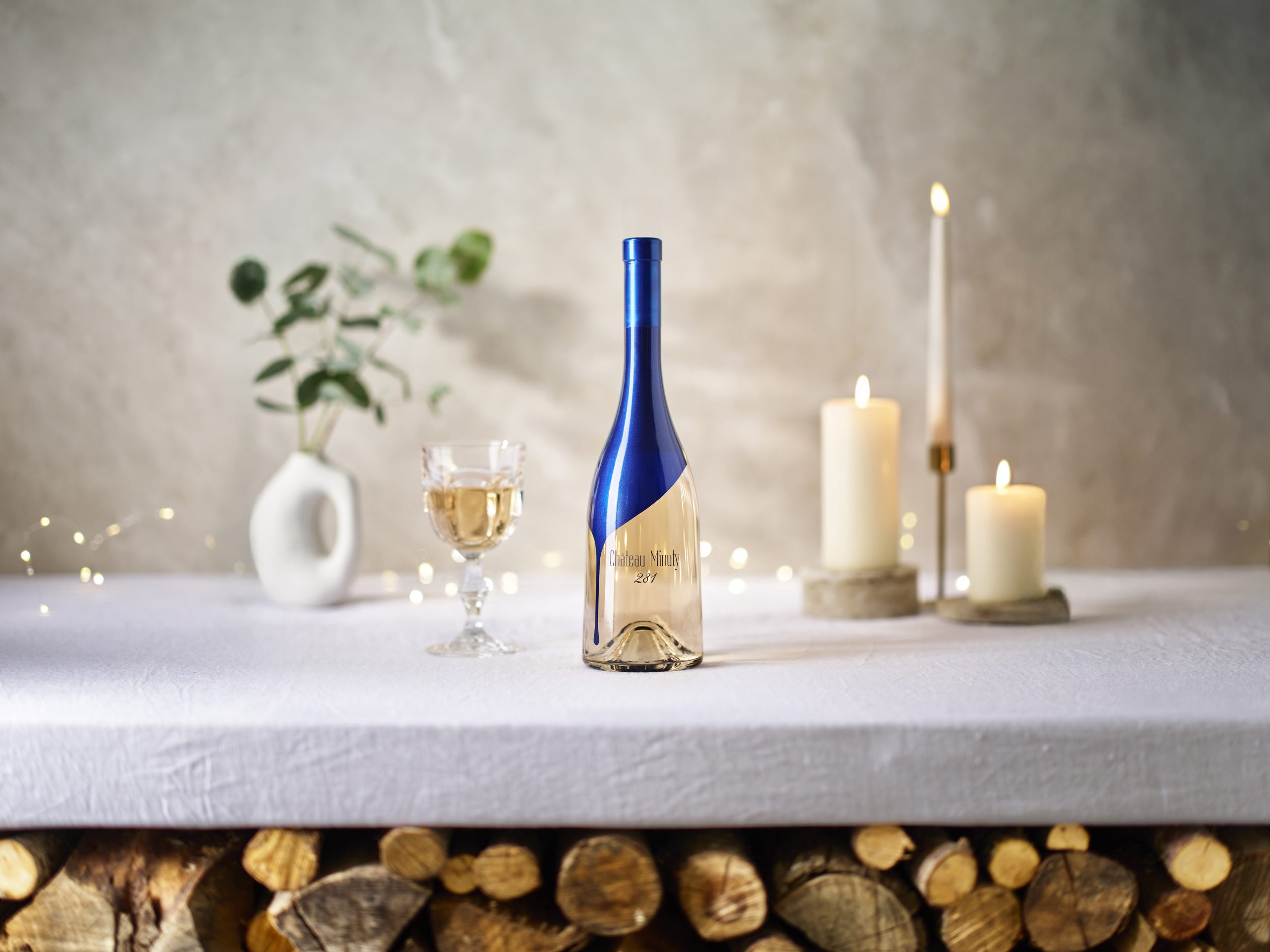Is this England’s most select wine estate?
Despite being 10 years in the making, Oxfordshire’s Hundred Hills is in no rush to release wines nor glean PR on what is very likely England’s most exclusive wine estate, says Douglas Blyde.
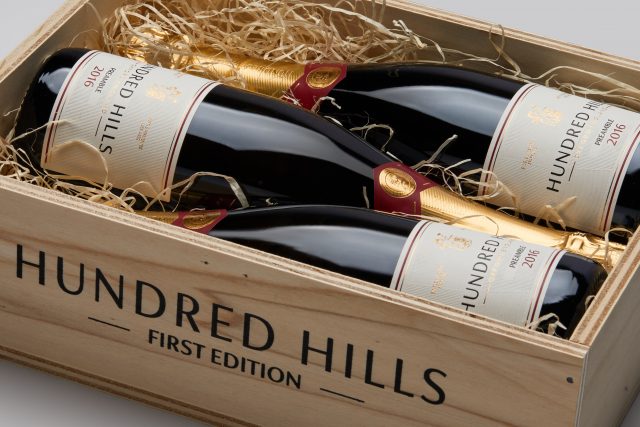
Bounded by ancient woodlands carpeted, during the time of my visit, in bluebells, no pylons mar perfectionist and founder, Stephen Duckett’s Hundred Hills wine estate because he had all twelve structures dismantled in favour of threading the cables deep underground. Nor will you encounter a deer heedlessly gorging on slowly ripened Chardonnay and Pinot Noir grapes because the herd Duckett discovered on first seeing what was then Bank Farm resulted in the construction of, unseen from the estate, two miles of fencing encapsulating the amphitheatre of 85,000 vines sown in this dry chalk valley, six miles north of Henley.
From the steepest parcels, planted by hand, all appears graceful, down to the mast like wooden poles supporting the rows chosen instead of utilitarian steel posts. “Wine is about dreams,” says Duckett, who wants the image that guests from America and Asia might have in their mind of an idyllic English vineyard to be fulfilled when they visit.
Bank Farm was once owned by official royal photographer, Norman Parkinson who was famed too for his studies of actresses and models in Harper’s Bazaar and Vogue and an edition of the Pirelli calendar. “It had been fallow ground for as long as anyone could remember, with hay occasionally being taken,” says Duckett of the farm. “Its last productive use as far as we can tell was for growing peas when they became fashionable in the sixteenth century.”
The opportunity to ‘start from scratch’ therefore was attractive. “Having bought the property to ostensibly plant an orchard, we started preparing the land in 2013, applying ferrous sulphate prior to planting to ensure the young vines had plenty of iron available, because vines struggle to access iron from very calcareous chalk soils. I’m surprised it’s not done more.”
Duckett graduated with a first in Engineering, Economics and Management from Oxford in 1990 and obtained a Fulbright Scholarship to go to Harvard Business School in the US. “From Harvard I spent the next 20 years involved with establishing a number of young software companies and then the internet businesses that emerged from them. Few of these are household names, but some such as Iris Software in the UK, Doubleclick (now part of Google) and Kronos in the US have become very substantial technology businesses.”
While Duckett has created businesses at the forefront of the software and internet revolutions, his attentiveness to farming stems from long familial roots. “I grew up amid the apple orchards and market gardens of the Somerset levels where my family has tended land for over 1,000 years including a parcel from the Norman Conquest,” he says. Unfortunately, that West Country farm was not suitable for vines.
The family farmland is all on the Somerset levels, which despite being drained many years ago, are far too wet for growing vines. Almost the only thing vines won’t tolerate is sitting in water, and the marine clays and peat moors of the Somerset levels are some of the wettest soils you’ll find in England. Beyond the soils, the rainfall during the growing season is far higher than in central and eastern England and the dampness in September and October would make botrytis in particular almost impossible to control effectively.
Hence Duckett embarked on a three-year quest to locate an appropriate site. “England generally, and the chalk valleys in particular, are characterised by very distinct microclimates. For vineyards in England, it is the specifics of frost formation, airflow, soil drainage and growing season rainfall that matter as much as the more macro hours of sunshine, growing season temperatures and annual rainfall characteristics. It is a caricature that the English are obsessed with the weather but none the less true,” he says.
“We found there were always locals in every valley who posessed detailed weather records, who knew where the spring frost collected and how the prevailing autumn winds affected the area. We also needed detailed soil sampling data which Dr. Michel Salgues, who had been involved in winemaking at Roederer for many years and in particular been responsible for establishing Roederer Estate in the Anderson Valley in California, facilitated via the laboratories in Champagne. Collecting that level of granular detail takes time and I led the data collection effort and microclimate analysis myself, but we always knew that the location of the vineyard was one of the few decisions that would be utterly irreversible.”
Located just 45 minutes’ drive from the fringes of West London, Bank Farm was discovered thanks to what Duckett terms ‘active stumbling’. “We’re located in the Stonor Valley which has a well-documented history as part of Pyrton Hundred,” says Duckett. “It runs East-West from the Chiltern Ridge down to the Thames at Henley and is a naturally dry chalk valley with substantial aquifers beneath it.”

Covetable Grappes Laches
Instrumental to advising on the clonal selection was the ‘well known and well respected Champenoise viticulturist’ Frank Mazy of the Epernay based Viti-Concept, “who is currently advising Taittinger’s Domaine Evremond in Kent,” says Duckett, “along with Dr. Michel Salgues and Pierre Marie Guillaume, a highly respected winemaker in Champagne, a professor of oenology at Montpellier and teacher and mentor to Jean-Baptiste Lécaillon at Roederer.”
Of an initial planting of 64,000 vines, Duckett recalls losing only 42 vines as their roots became established. The vineyards now reach almost 17 always undulating hectares, with 10 parcels drawing on 10 clones, including two hectares of Grappes Laches ordered from the Pépinières Guillaume based in Charcenne in France, which has provided for generations arguably the finest Chardonnay and Pinot Noir vines to the vineyards of Burgundy and Champagne. “Pierre Marie Guillaume is deeply engaged in the ongoing work to produce specialised clones for high-end wine production around the world as climate change continues.” With its loose knit clusters and natural late seasons disease resistance, Duckett praises the ‘expressiveness’ that Grappes Laches confers as a base for rosé. He is clearly not alone in his admiration given that some of the plants mysteriously disappeared.
It is best not to bring up ‘unexceptional’ Pinot Meunier with Duckett which he has declined to plant. “It is not actually a distinct clone in itself but rather a high yielding, low quality, frost resistant form of Pinot Noir,” he says. “It is grown extensively in some of the more frost prone regions in Champagne to provide large quantities of easy drinking base wines for blending but was very rarely used in fine Champagnes historically.”
Harvesting is done by hand, although Duckett recalls the moment his Romanian pickers fled the vineyard when spooked by Russia-spurred propaganda that the English were pumping COVID into the air. Only by sending his own family into the vineyards did he manage to reassure them that that was not the case.
Built by local architect, NBW in time for the first vintage of 2016, the purpose-built, and from the outside, barn-like winery conceals an immense investment in technology, and is core to Duckett’s policy for Hundred Hills to become carbon neutral. Indeed, wines are accredited as ‘Sustainable’ by WineGB. The bottling line can handle 3,500 bottles an hour and is in view of two Coquard presses which operate over a four-hour cycle plus a one hour loading time. “Being far from Champagne, we wouldn’t have to wait for spare parts should one press develop a fault,” says Duckett. Production stands at 3,500 cases a year now and could make up to 12,000 “though we’re not a contract winery.”
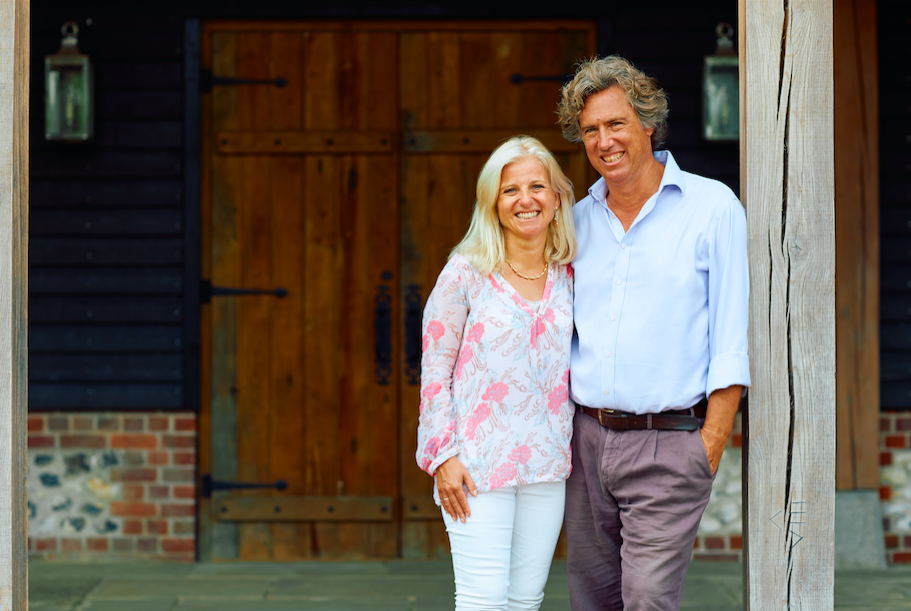
Partner Content
Cold stabilising, stainless steel tanks bear the emblem of a regal lion with sun stoked wine glass and grapevine designed by Master of Wine and artist, Neil Tully of agency, Amphora in Bath. “Amphora has been designing labels and packaging for the wine industry around the world for many years and it was Neil and his team who developed the graphic designs we use today using the inspiration of my very old family shield.”
From grapes left to ripen often until as late as the end of October, which are arrested with dry ice on receipt at the winery, Duckett releases up-to six wines per vintage. These include at least two rosés, one being a ‘totally uncommercial’ Rosé de Saignée which although “a beautiful wine” is “a pig to make” says Duckett – and two Blanc de Blancs.
All eschew malolactic fermentation given Duckett’s palatal preference for styles such as Champagne Vilmart Coeur de Cuvée, whose fifth-generation leader, Laurent Champs has tasted in Rilly-la-Montagne with the Hundred Hills team. “Malolactic fermentation would see the detail of our very clean grapes lost,” says Duckett. Meanwhile, regular bâtonnage adds richness of texture. Base wines are often aged in foudres from Tonnellerie Rousseau.
Wines are packaged with labels showing a map of the vineyard and the blocks from where each cuvée comes. The house style is strikingly generous, fresh, highly drinkable and assured, with my personal favourite being the 2017 Blanc de Blancs, which spent three months in cask followed by 30 months of lees ageing. Within aromas of nectarine, apricot, greengage, and Cox’s apple give way to a crisp, yuzu-like freshness on an otherwise chalky palate. These are released in wooden hinged boxes.
Does Duckett have plans to make a still Pinot Noir? “In my lifetime we may make a world class Pinot Noir, though I doubt I’ll get to drink it. We do have barrels of 2018 for family, though.”
One of Duckett’s four children, Amy, who studied at London School of Fashion has also created a cuvée of her own to appeal to a younger consumer in chichi destinations. Doe Eyed Queen, with appealing floral branding not unlike Perrier-Jouët Cuvée Belle Epoque, is approachable with a more generous dosage.
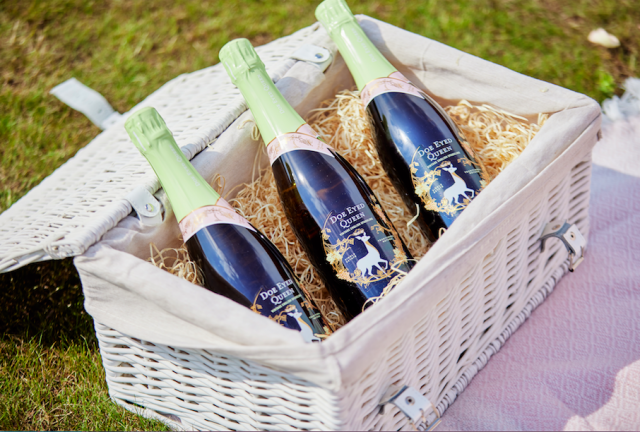
New World Mentality
However, despite French savoir-faire informing the creation and operation of the estate, Duckett takes a New World approach when it comes to selling the wines. “While building tech companies I saw California go from farming to technology. My vision for English wine is more Napa than Champagne.” Positioning Hundred Hills at the ‘elite end’, Duckett has created two versions of a membership club. “We are not open to the public but if people do wish to visit and taste our wines, we offer an annual membership for £600 which buys a case of twelve of our wines on current release, a visit and tasting for up to six guests, a cellar door discount on further purchases and an invitation to our very popular pre-Christmas drinks reception.”
Then there is The Hundred Club membership which involves an initial outlay of £20,000 with a minimum term of three years. “It offers a small group of no more than 100 wine enthusiasts the opportunity to be much more involved with Hundred Hills and the creation of the different wines from each vintage. As well as receiving wines regularly throughout the year, Hundred Club members get the opportunity to hold small events at Hundred Hills and bring guests to see the vineyards and taste the wines.”
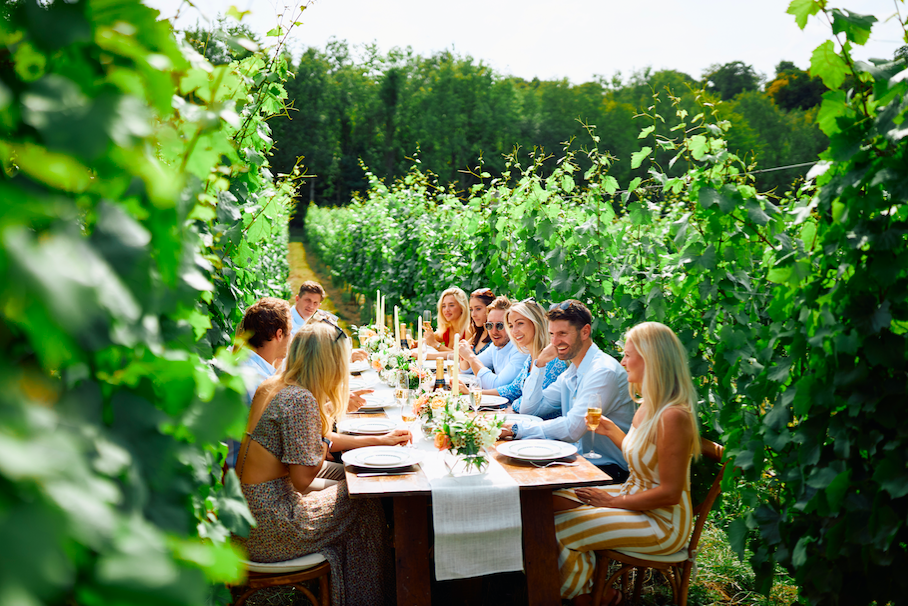
Members can be involved throughout the winemaking process, and even learn something of the art of base wine tasting as they follow wines all the way through from pressing to release. “There are invitations to several events we hold throughout the season, which given Hundred Club members the chance to get to know each other, and in particular to the Harvest Dinner which celebrates the end of each vintage in style!”
Members may also soon be able to visit the hut with a pizza oven and wine stocked fridge at the pinnacle of the site, known as Hilltop. The steep incline to reach it makes an excellent impromptu ski track, too, notes Duckett.
Of the membership, Duckett adds that England is full of wine lovers. “For the first time, some of these local wine enthusiasts have the opportunity to really be involved with the vineyards that produce the wines they love, engage in winemaking and enjoy the excitement year on year as new vintages evolve and are ultimately released. All of our Hundred Club members so far fall firmly into this group and it is definitely the chance to be involved at close quarters with the creation of world class wines that encourages people to join.”
Releases occur in as leisurely a manner as possible given that the project is so well funded. These are predominantly allocated to members, although Duckett has befriended Raymond Blanc OBE at Le Manoir aux Quat’Saisons where head sommelier, Lukas Hyner, pours 2016 Preamble First Edition. Blanc, incidentally, has proved such a fan that he is preparing to plant a vineyard at the Great Milton estate, notes Duckett. Over time, and at the request of members, Duckett is also interested in identifying a list of no more than 12 top London restaurants and members clubs to pour Hundred Hills by the glass as their core pour.
In time, Duckett has plans to stock more worldly wines from family estates via Atlas Fine Wines to serve at the estate and has planning permission to build a substantial estate house and spa to complement the on-site yoga studio to further heighten the appeal of the boutique vineyard as ‘a paradise for wine lovers.’
For more information on Hundred Hills, click here
Watch below to discover how to taste any wine in the world without even needing to open the bottle:


